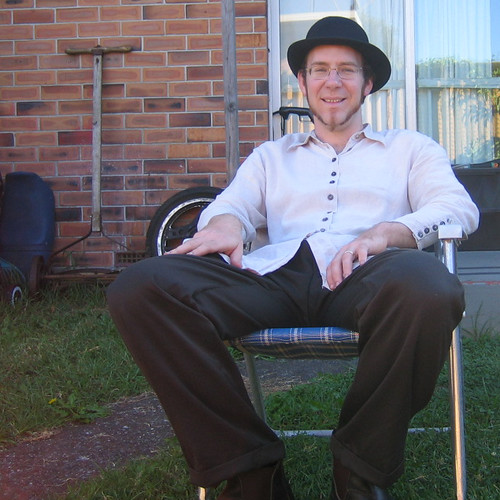Good news! As best we can measure, Heather and I have reduced
our CO2 footprint to
30% below the global average. This is a sizeable step
1 towards the 40% rich-world reduction which groups like
Oxfam are calling for by 2020, a supposedly unreachable target which will 'destroy the economy'. We were encouraged how close we were with 10 years to go, after only moderate changes. No "extreme" measures like detaching from the grid or composting toilets.
Remember, though: we still need
3 planets to absord the carbon emitted if everybody on earth lived like us. Let's not get too self-congratulatory.
Heather and I are constrained to a quiet life by her health, but it's still a distinctly Kiwi lifestyle and we enjoy the benefits of living in a wealthy country. We have made choices to constrain 'expenditure' which gave low return on investment, so that we have plenty to put into activities which bring abundant enjoyment.
Our lifestyle is specific to ourselves, and features several elements that will be particularly difficult for some. For example, we have found work, friends and shops close to home which eases the choice to cycle. Others may find that choice harder until they move house, but over time more
walkable (and cycleable) communities will emerge. We also utilise interim practises like buying second-hand, which clearly don't work if everybody tries to do them. These represent further problems to solve, and of course there are plenty of things (like raising kids) that we just don't do. Nonetheless, we are encouraged by the progress we have made and feel confident that others will be making progress on those other challenges.
One challenge all Kiwis face is that public services cost 840kg CO2e/person/year. That represents 2/3 of the globally sustainable per-capita level (2010 population), before we make
any direct personal consumption choices. Fully 1/2 this figure comes from building and maintaining roads!
All this thinking comes from the
environmental footprint data for the two of us which hardworking Heather has again compiled. She put them together from a detailed 3 month
audit and ongoing tracking of unusual consumption items. This data was primarily recorded to calculate a Greenhouse Gas footprint, but she has worked to extract additional estimates from the data.
There is also a
year-to-year comparison of our CO2 figures, with retrospective adjustments for new factors added to our
audit spreadsheet in the last year. The graph clearly shows the impact of my flying to China in late 2008 (2009 tax year). Something to chew on as I consider flying to Christchurch next month for a cycle polo tournament, which would cost 0.6T -- 15% of my 2010 total emissions.
See the
main report for details, graphs and comments, but here are the key numbers as multiples of the sustainable global average footprint
- CO2e - 3
- Fresh Water (crops) - 1.43
- Fresh Water (industrial) - 1.08
- Agricultural Land - 0.7
- Forest Land - 0.04
- Fisheries - 9
Those last two numbers are separated out because they are quite sketchy: the Forest Land number fails to account for the wood used to build our house, and the appropriate baseline for comparison for Fisheries is unclear.
About the fish, I can say that Heather eats a moderate amount of tin fish for health reasons but our fish sauce use is the biggest contributor to that number. We were surprised to find that, and are looking into whether this is an artefact of valuing a genuinely 'cheap' fish at the average rate or whether we need to hold the sauce for special occasions. I have a strong preference for one outcome over the other!
1. It is hard to exactly correlate the GHG footprint figure to numbers like the 40% reduction which Greenpeace is calling on New Zealand to make because our numbers are consumption based and the big public figures are production based. (I hope to write more on this soon, if you're not familiar with what I'm talking about.) We're actually at a 60% reduction from NZ's 2001 consumption figure, and if all of the rich world dropped their consumption that much then the production required to enable that consumption would drop dramatically.


 I'm not sure how an iota stacks up against 0.2%, but there is a point to be made that NZ going it alone won't solve the problem. Another point is clearly seen in the right hand graph--that NZ is above the median emissions level on a per-capita basis and has a moral responsibility to act.
I'm not sure how an iota stacks up against 0.2%, but there is a point to be made that NZ going it alone won't solve the problem. Another point is clearly seen in the right hand graph--that NZ is above the median emissions level on a per-capita basis and has a moral responsibility to act.
 The red bars on this graph represent data that we rarely see: estimated emissions embedded in the provision of goods and services consumed within a country. These contrast strikingly with the emissions generated for the goods and services created in the country. This data is harder to measure, which I assume is why the Kyoto process isn't using it, but is significant in terms of where the dollars would end up if there were a global carbon price.
The red bars on this graph represent data that we rarely see: estimated emissions embedded in the provision of goods and services consumed within a country. These contrast strikingly with the emissions generated for the goods and services created in the country. This data is harder to measure, which I assume is why the Kyoto process isn't using it, but is significant in terms of where the dollars would end up if there were a global carbon price.


